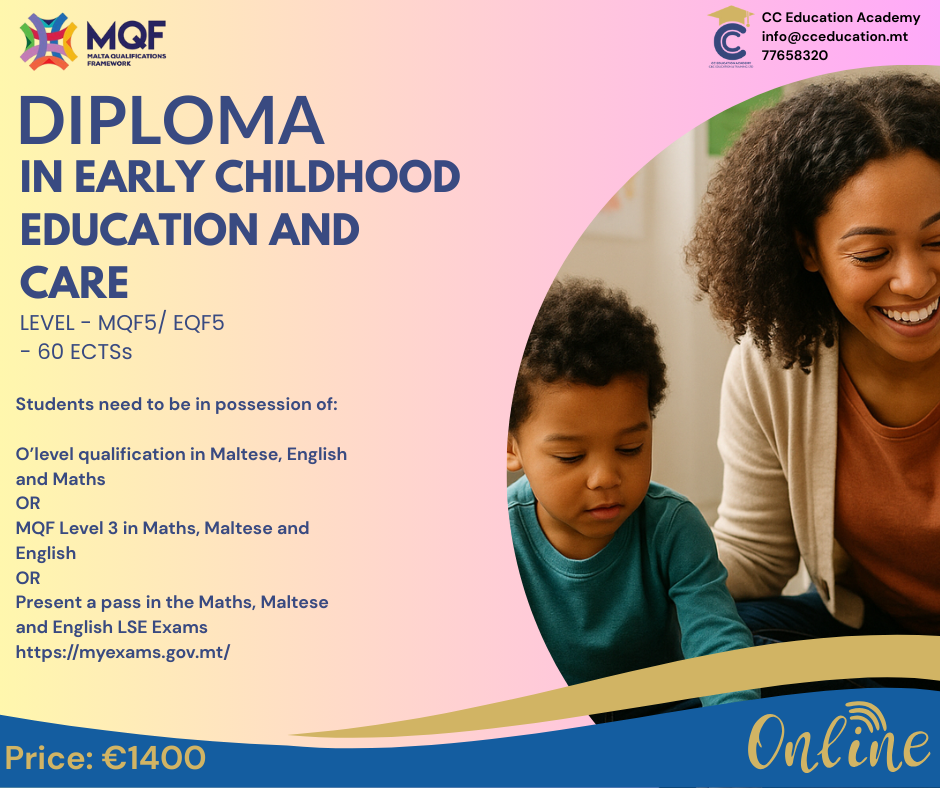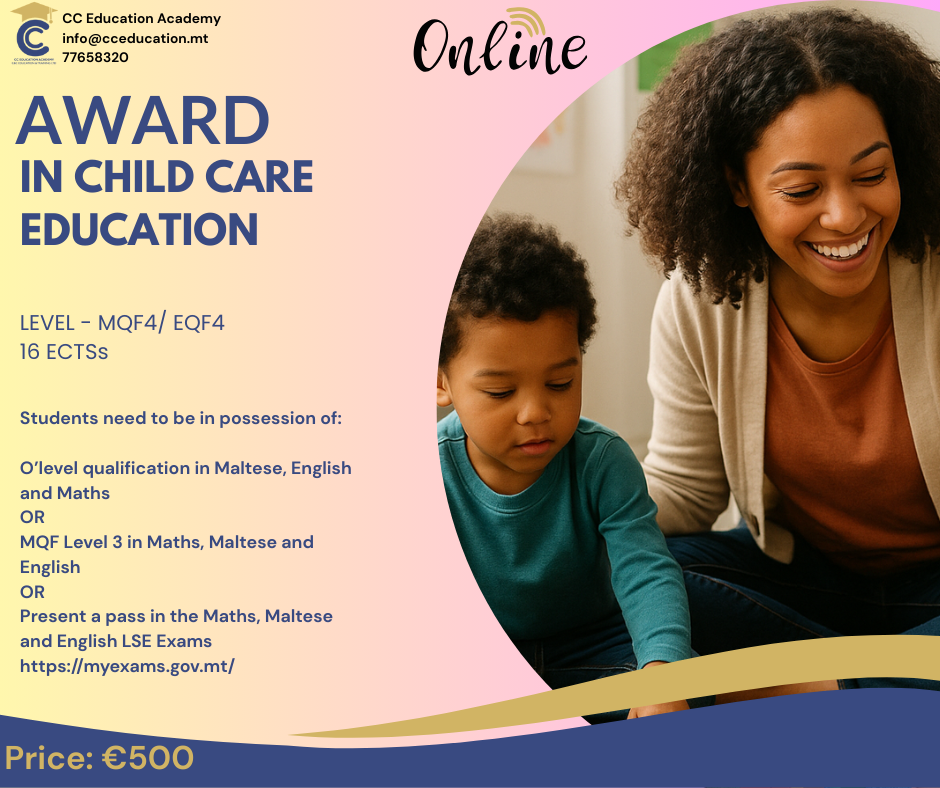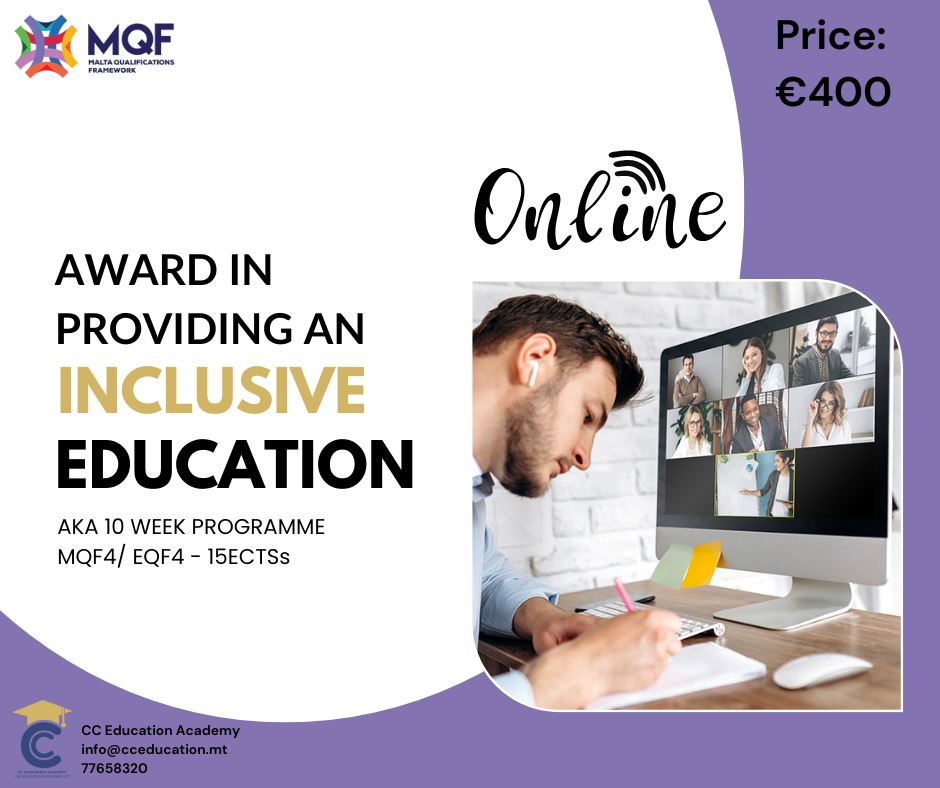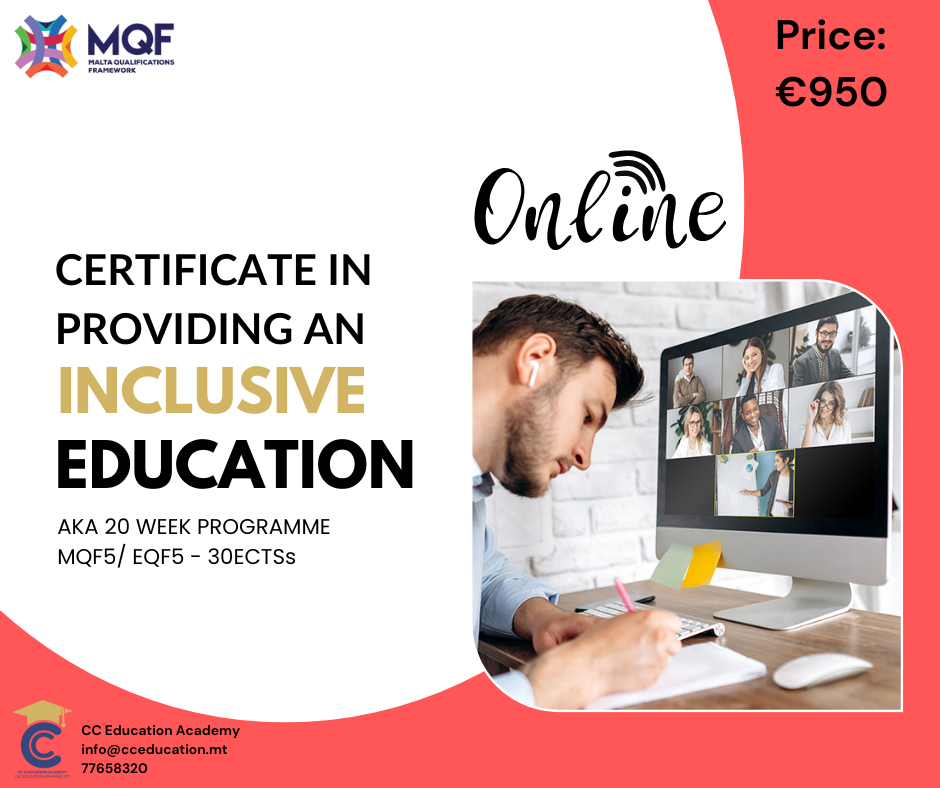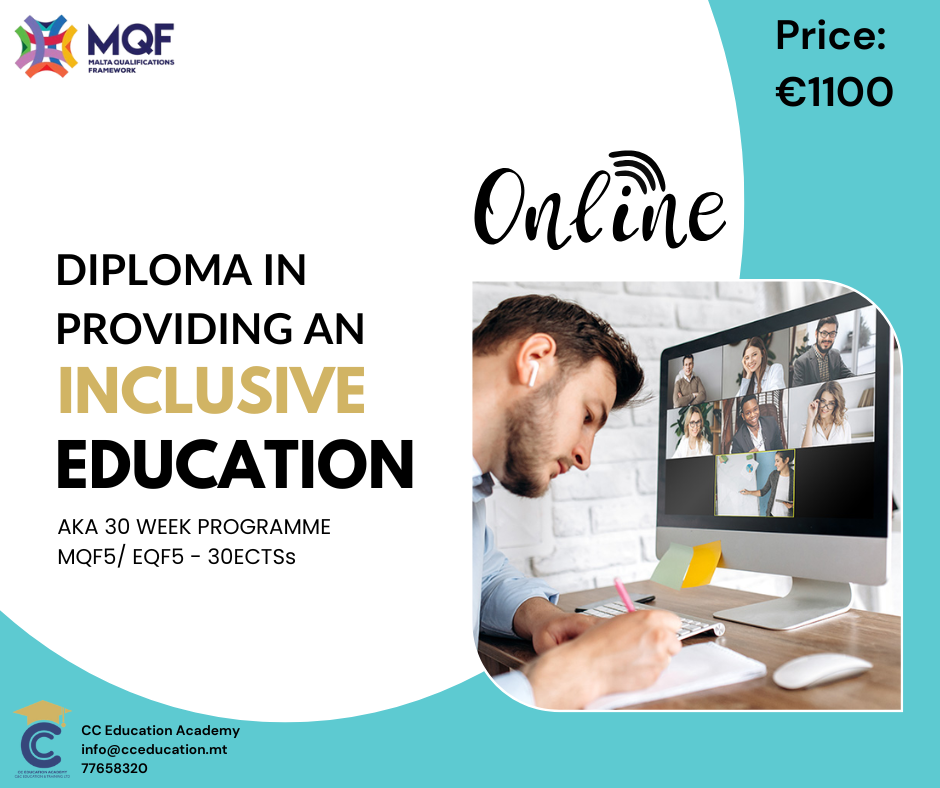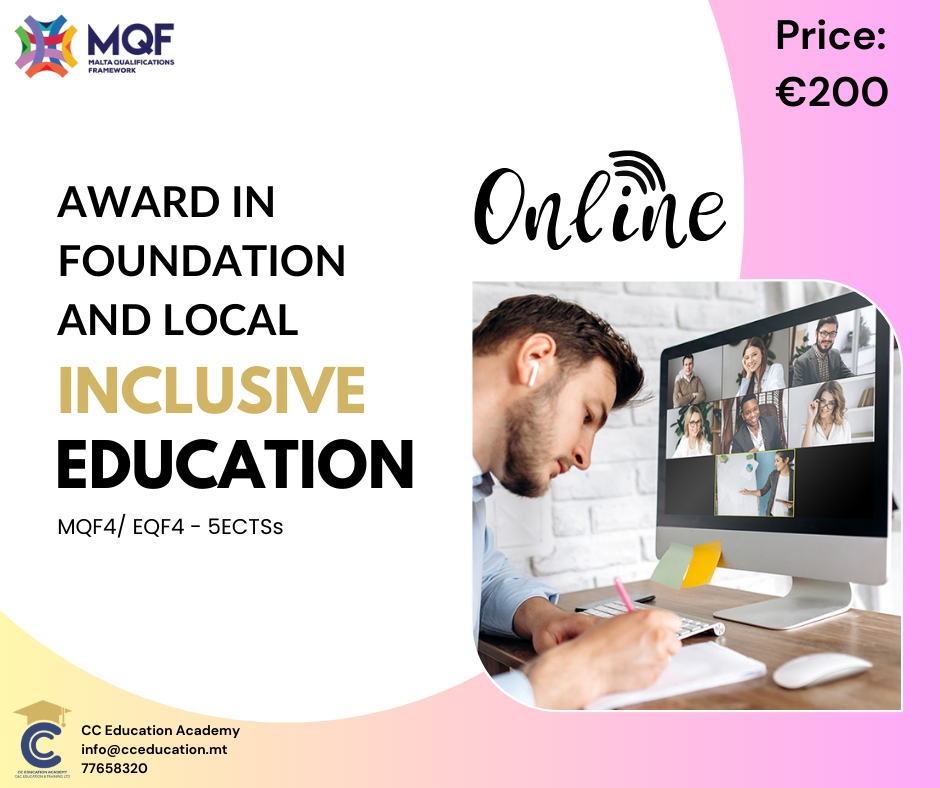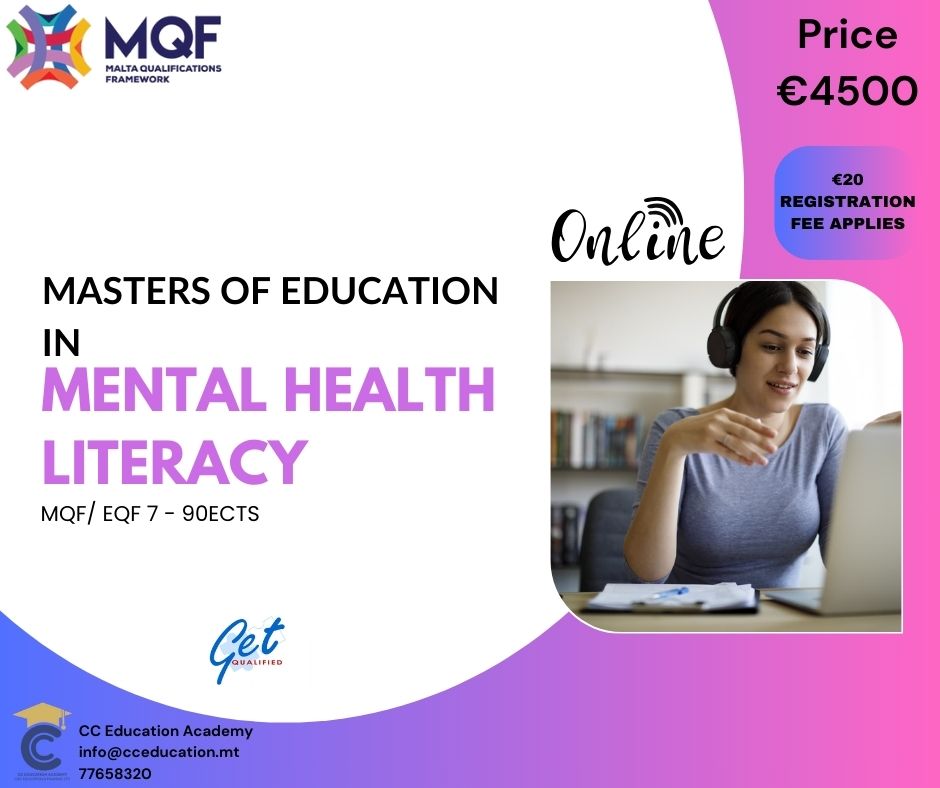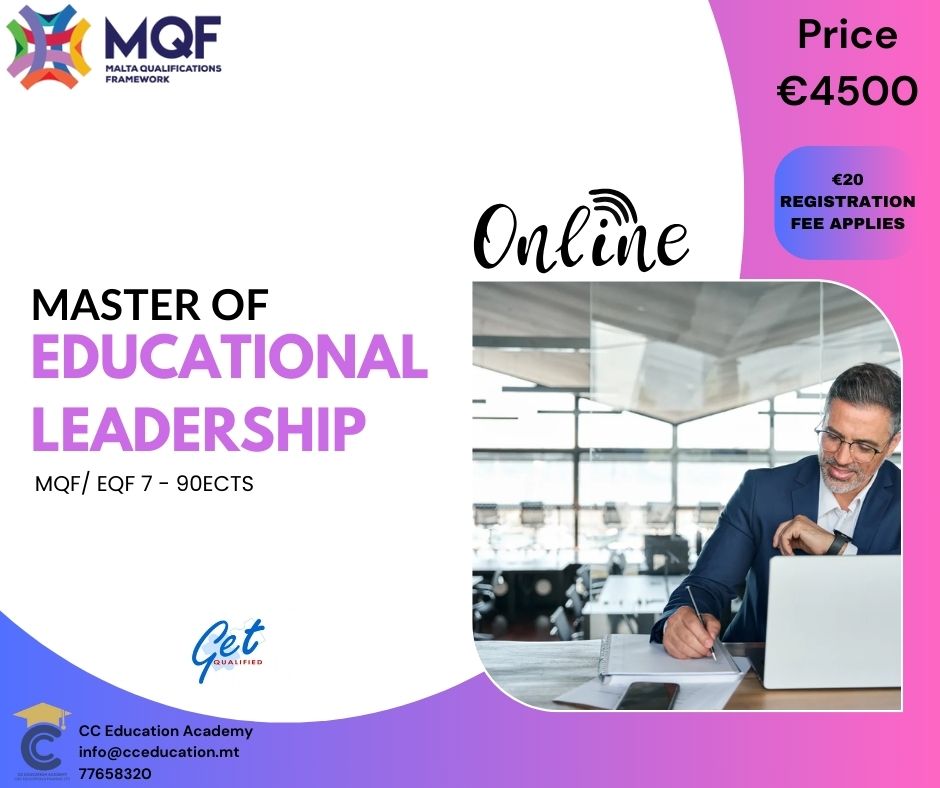CC Education Academy
Licensed as a Higher Education Institution by the MFHEA
Licence no. 2022-019
The Programme
This programme consists of four modules, each worth 4 ECTSs (about 100 hours), delivered through online lectures, forum discussions, and readings. The modules provide a comprehensive foundation in early childhood education for children from birth to age 5. Students learn about child development—covering physical, cognitive, social, and emotional growth—and gain skills in observing and supporting children’s development using play-based, participatory, and social pedagogies. The programme also focuses on creating safe, healthy environments through instruction on health and safety, including risk assessment, hygiene, and emergency procedures. Communication development is addressed, giving students tools to support language growth, foster multilingualism, and handle communication challenges. The child-led learning module trains students to follow children’s interests, foster autonomy, and create inclusive, empowering environments that stimulate exploration, creativity, and self-directed learning. Assessment across modules includes forum discussions, case studies, and the creation of practical resources, ensuring that theoretical knowledge is directly linked to practical application in childcare settings.
Course Content
Growing Minds – Understanding Child Development
4ECTSs (equivalent to 100 total hours, which include self-study and assessment hours)
Mode of delivery: Online Lectures, Forum Discussion, Reading
This module offers an in-depth study of child development from birth to age 5, covering physical, cognitive, social, and emotional growth, while examining major theories and influential factors. Emphasizing play-based, participatory, and social pedagogies, it equips students with observation and assessment skills crucial for creating inclusive, developmentally supportive environments. By integrating theory with practical application, the module prepares students to foster curiosity, creativity, and well-being in children, empowering them for impactful work in early childhood education and care.
Assessment methods: Forum Discussion & Case Study
Safe Spaces: Health and Safety Practices
4ECTSs (equivalent to 100 total hours, which include self-study and assessment hours)
Mode of delivery: Online Lectures, Forum Discussion, Reading
This module prepares students to create and maintain safe, healthy environments for children by covering crucial aspects of health and safety in childcare, such as risk assessment, accident prevention, emergency procedures, hygiene, safe sleep, food safety, and medication administration. Through practical exercises and case studies, students develop skills to conduct thorough safety checks, establish effective safety practices, and respond confidently to various scenarios. Integrating play-based, participatory, and social pedagogies, the module encourages children’s active engagement in learning about safety through enjoyable activities and decision-making. By the end, students will be equipped to foster a culture of safety, support children’s wellbeing, and ensure compliance with relevant standards in childcare settings.
Assessment methods: Forum Discussion & Creation of Resources
Expressing Ourselves: Development of Communication Skills
4ECTSs (equivalent to 100 total hours, which include self-study and assessment hours)
Mode of delivery: Online Lectures, Forum Discussion, Reading
This module equips students with the knowledge and practical skills necessary to support children’s communication development in early childhood settings. It covers key aspects of language acquisition, effective strategies for enhancing both verbal and non-verbal communication, and early identification of communication difficulties. Students will explore creating language-rich environments, implementing questioning techniques, supporting multilingualism, and using storytelling and technology to promote language skills. Emphasizing play-based pedagogy, the module encourages interactive, imaginative activities that nurture children’s language and confidence. Participatory and social pedagogies are also integrated, empowering children to actively shape their own learning and fostering inclusive, supportive communities. By the end of the module, students will be prepared to design and maintain environments that promote effective communication for all children, aligned with current curriculum guidelines and best practices in early education.
Assessment Methods: Forum Discussion & Case Study
Children Lead: Implementing a Child-Led Approach
4ECTSs (equivalent to 100 total hours, which include self-study and assessment hours)
Mode of delivery: Online Lectures, Forum Discussion, Reading
This module equips students with the knowledge and skills needed to implement child-led practices in childcare settings, focusing on child-centered learning theories, observation techniques, and responsive strategies for following children’s interests. Students will learn to create enabling environments that support child-initiated play, balance routines with flexible activities, and document children’s learning and decision-making processes. The module emphasizes play-based learning as central to fostering exploration, creativity, and self-directed growth, while also incorporating participatory and social pedagogies to promote children’s active involvement, positive relationships, and a sense of community. By the end, students will be prepared to create inclusive, empowering environments that honor children’s autonomy and engagement, ensuring holistic development in line with early years curriculum guidelines.
Assessment Methods: Forum Discussion & Creation of Resources
General Information
Course delivery: ONLINE
Course duration: 16 weeks on a part time basis OR 12 weeks on full time basis
Date of next intake: Periodically - Interested students are to register their interest and be contacted once another intake is announced
Language of Delivery: English/ Maltese
Placement hours: 200hrs
Price: €600 + €20 registration fee
Total Hours (which includes self-study and assessment hours calculated according to the MFHEA guidelines) – 400 hrs
Entry requirements
Students need to be in possession of:
O’level qualification in Maltese, English and Maths
OR
MQF Level 3 in Maths, Maltese and English
OR
Present a pass in the Maths, Maltese and English LSE Exams https://myexams.gov.mt/
Target Audience
Students who wish to pursue a career in Child Care Education, and Kindergarten Educators
Grading
The grading system uses the following boundaries:
A: 80–100%
B: 60–79%
C: 45–59%
Fail: 0–44%
Student Success Rate
Programme has been accredited in August 2025, and no relevant statistics have been gathered yet.
Learning Outcomes
Award in child Care Education – MQF4 – 16ECTSs
Part time – 20 weeks - 400hrs, Full time – 12 weeks – 400hrs
Programme Learning Outcomes
By the end of the programme, the learner will be able to:
Collaborate effectively with colleagues, families, and professionals in childcare settings.
Comply with relevant regulations, standards, and ethical guidelines in early childhood.
Ensure the implementation of developmentally appropriate practices that support children’s holistic growth.
Be responsible for creating and maintaining safe, inclusive, and nurturing environments for children.
Carry out tasks related to children’s daily care, learning, and development with professionalism and empathy.
Guide children’s behaviour positively, promoting self-regulation and social-emotional development.
Supervise children’s activities, ensuring their safety and engagement in meaningful experiences.
Monitor children’s progress and wellbeing through systematic observation and assessment.
Manage resources efficiently to support high-quality care and education.
Create comprehensive plans that address children’s individual needs and interests.
Produce accurate and timely documentation of children’s learning and development.
Represent the childcare profession with integrity and dedication to best practices.
Negotiate constructive solutions to challenges in childcare settings.
Ensure the implementation of hygiene and safety practices that protect children’s health.
Be responsible for promoting children’s rights and equity in all aspects of care and education.
Mange the implementation of nutrition plans that support children’s health and development.
Create environments and experiences that foster children’s communication skills.
Produce reflective analyses of professional practices to drive continuous improvement.
Ensure the application of child-led approaches that respect children’s autonomy and interests.
Design play-rich environments that stimulate creativity, problem-solving, and self-regulation through child-led exploration.
Facilitate play experiences that align with developmental milestones, fostering emotional wellbeing, collaboration, and early literacy and numeracy skills.
Use play as a diagnostic tool to observe and assess children’s cognitive, social, and emotional growth.
Engage children as co-learners in decision-making, allowing them to set goals, negotiate rules, and direct activities.
Scaffold child-led inquiry through open-ended questions, collaborative problem-solving, and reflection.
Support children’s agency by integrating their interests, cultural funds of knowledge, and lived experiences into curriculum planning.
Build nurturing relationships that promote trust, empathy, and a sense of belonging within diverse communities.
Model prosocial behaviours to guide children in resolving conflicts, respecting others’ perspectives, and practicing fairness.
Create inclusive environments that celebrate diversity, advocate for children’s rights, and address inequities.
Define key theories and principles of child development across various domains.
Describe how play-based pedagogies support cognitive, social, and emotional development.
Explain participatory pedagogies and their role in fostering agency and self-regulation.
Outline the principles of social pedagogy and their importance in inclusive relationships.
Describe effective strategies for engaging and communicating with parents and families.
Identify appropriate observation techniques for assessing children’s learning and development.
List the fundamental rights of children as outline in the UN Convention on the Rights of the Child.
Recall essential health and safety practices required in childcare settings.
Define proper hygiene protocols for maintaining a clean and healthy childcare environment.
Describe nutritional requirements for babies and young children at different developmental stages.
Identify best practices for providing physical care to children of various ages.
List strategies for supporting children’s communication and language development.
Define reflective practice and its importance in professional growth.
Describe the principles of child-led learning approaches in early childhood education.
Recall the key components of effective teamwork in childcare settings.
Identify key milestones in children’s social-emotional development.
List the components of high-quality early childhood education programmes
Demonstrate proficiency in implementing developmentally appropriate practices.
Apply effective communication strategies when interacting with children, families, and colleagues.
Practice systematic observation techniques to assess children’s development and learning.
Show competence in planning and implementing engaging learning experiences for children.
Demonstrate adaptability in responding to children’s diverse needs and interests.
Apply principles of inclusive practice to support all children’s participation.
Apply theories of child development to create age-appropriate learning experiences that support children’s holistic growth.
Demonstrate effective observation techniques to assess and document children’s developmental progress and learning needs.
Design and implement emergent curriculum activities that foster children’s curiosity, creativity, and problem-solving skills.
Create inclusive learning environments that care to diverse learners, including those with special educational needs.
Employ effective communication strategies to build positive relationships with families and collaborate on children’s development.
Implement health and safety practices to ensure a secure environment for children in early childhood settings.
Utilise reflective practice techniques to continuously improve their professional skills and pedagogical approaches.
Demonstrate proficiency in providing physical care for babies and young children, including feeding and dressing.
Implement strategies to promote children’s communication skills development across various domains.
Apply principles of children’s rights and equity to create fair and inclusive early childhood environments.
Conduct basic health assessments and respond appropriately to common childhood health issues.
Utilise sociograms and other observational tools to assess and support children’s social development.
Demonstrate professional competence in practical work placements, applying theoretical knowledge to real-world childcare settings.
Design and facilitate play-based learning experiences that support children’s agency, creativity, problem-solving, and collaboration.
Use intentional teaching strategies (e.g. questioning, modelling, scaffolding) to extend children’s learning and enjoyment during play-based activities.
Support children’s participation in decision-making and planning activities, fostering independence and self-confidence.
Implement group-work and cooperative learning strategies (e.g. think-pair-share, jigsaw, buzz groups) to develop children’s collaborative and communication skills.
Build and maintain nurturing, trusting relationships with children, families, and colleagues using principles of social pedagogy.
Model and guide prosocial behaviours, conflict resolution, and emotional regulation within group settings.
Adapt paly and learning environments to reflect children’s interests, cultural backgrounds, and individual needs.
Module 1: Growing Minds: Understanding Child Development
Module Learning Outcomes
Collaborate with colleagues to implement age-appropriate play-based activities that promote holistic child development from birth to age 5.
Apply knowledge of key theories and current research in child development to observe, assess, and document children’s progress across physical, cognitive, social, and emotional domains.
Adapt pedagogical approaches to meet the diverse developmental needs of children, incorporating participatory and social pedagogies to support individual growth and inclusion.
Create safe, stimulating, and inclusive environments that foster optimal development and wellbeing, in compliance with relevant childcare regulations and best practices.
Use appropriate assessment tools and methods to accurately document children’s developmental progress and identify potential areas of concern or need for additional support.
Carry out daily care routines that support healthy child development, integrating developmental knowledge into practice.
Communicate effectively with parents and caregivers, guiding them in understanding key developmental milestones and strategies to support their child’s growth at home.
Supervise and facilitate childcare activities, ensuring a nurturing developmentally appropriate, and play-based environment.
Monitor and evaluate children’s progress across all developmental domains, using observations to inform planning and support strategies.
Develop and implement individualised development plans based on observed needs, theoretical knowledge and collaborative input from colleagues and families.
Manage resources and learning materials effectively to create engaging, developmentally appropriate learning experiences that reflect current research and best practice.
Design and evaluate developmentally appropriate curricula that integrate key theories of child development and a range of pedagogical approaches, including play-based, participatory, and social pedagogies.
Produce comprehensive reports on children’s developmental progress for parents, colleagues, and other professionals using clear and professional language.
Demonstrate professional conduct and communication, representing best practices in early childhood development and fostering a culture of reflective practice.
Advise on the selection and use of age-appropriate toys, materials and digital resources that promote learning and development, in line with current research and best practice.
Critically analyse key theories and influential factors in child development from birth to age 5.
Describe and evaluate the physical, cognitive, social, and emotional aspects of child growth during the first five years of life, identifying major milestones and variations.
Apply theories such as Piaget’s stages of cognitive development and Vygotsky’s zones of proximal development to real-life observations and planning in early childhood settings.
Analyse primary attachment styles and their impact on children’s social-emotional development, using case studies and observations.
Conduct clear, objective, and meaningful observations of children across various settings, using appropriate assessment tools and methods.
Distinguish between typical and atypical development patterns and identify when to seek additional support or intervention.
Design and implement age-appropriate, play-based, and inclusive activities that promote holistic development for different age groups, and justify choices using current research and theory.
Evaluate and create well-designed early childhood learning environments that support optimal development, safety, and inclusion.
Apply effective strategies for supporting social-emotional development and fostering positive relationships and community within early childhood settings.
Develop and assess developmentally appropriate curricula that reflect key theories, current research, and a range of pedagogical approaches, including play-based, participatory, and social pedagogies.
Select and justify the use of appropriate assessment tools for evaluating different aspects of child development and use findings to inform planning and support.
Demonstrate understanding of major early childhood education approaches (e.g., Montessori, Reggio Emilia) by comparing and contrasting their features and applications in practice.
Use foundational theories of child development to analyse and respond to real-world scenarios in childcare settings
Demonstrate proficiency in observing and recording children’s behaviours and milestones across physical, cognitive, social and emotional domains
Select and apply appropriate assessment methods to monitor and support children’s development.
Design and implement activities that foster holistic development for children from birth to age 5, integrating play-based, participatory and social pedagogies.
Arrange physical spaces and resources to promote safe exploration, learning, and inclusivity for diverse age groups and abilities.
Prepare clear and informative progress reports for parents and caregivers, highlighting children’s growth and areas for support.
Apply evidence-based strategies and principles of positive guidance to manage group dynamics and address challenging behaviours.
Implement strategies to nurture social-emotional growth, resilience, and positive relationships among children.
Use common early childhood education resources and equipment safely and effectively.
Choose and integrate age-appropriate songs, rhymes, and stories to support early literacy and language development.
Modify learning experiences and environments to ensure accessibility and inclusion for children with diverse backgrounds and abilities.
Organize and maintain portfolios that document children’s developmental progress over time.
Establish collaborative relationships with families to support consistent developmental approaches between home and childcare settings.
Demonstrate proficiency in observing and documenting child behaviours across different developmental domains from birth to age 5
Apply key theories of child development to create age-appropriate activities that promote holistic growth in babies and young children
Show competence in using various child assessment tools to evaluate physical, cognitive, social, and emotional development
Practice effective communication strategies with young children to support their language and literacy development
Design supportive and stimulating learning environments that foster optimal development for different age groups within early childhood settings
Use digital observation tools and apps to record and analyse child development milestones efficiently
Create digital portfolios showcasing children’s developmental progress over time using appropriate software or platforms
Utilise online resources and databases to access current research and best practices in early childhood development
Implement age-appropriate educational technology and digital learning materials to support cognitive development in young children
Apply digital communication tools to prepare and share comprehensive developmental progress reports with parents and caregivers
Module 2: Safe Spaces: Health and Safety Practices
Module Learning Outcomes
At the end of the module/unit the learner will have acquired the responsibility and autonomy to:
Collaborate with colleagues to develop, implement, and review comprehensive health and safety protocols in childcare settings, ensuring a consistent and inclusive approach to safety management.
Comply with and interpret relevant regulations and standards for maintaining safe and healthy environments for children, demonstrating an understanding of legal and ethical responsiblities.
Ensure that all areas of the childcare facility meet safety requirements through regular inspections.
Create, maintain, and update detailed safety plans for the childcare facility, incorporating input from colleagues, children, and families to ensure plans are practical and inclusive.
Carry out systematic risk assessment and hazard identification in childcare environments, involving children and staff in the process to promote awareness and shared responsibility.
Guide and support staff members in the implementation of effective accident prevention techniques and emergency procedures, providing training and fostering a culture of safety.
Supervise and model hygienic practices to prevent the spread of infectious diseases, integrating these practices into daily routines and play-based activities to reinforce healthy habits.
Monitor safety compliance through regular and thorough safety checks, documenting, findings and communicating results to relevant stakeholders.
Manage the response to accidents and emergencies effectively and calmly, prioristing the wellbeing of children and other colleagues, and following establishe protocols.
Design and deliver educational materials and activities to promote safety awareness among children and colleagues, using play-based, participatory, and social pedagogies to ensure engagement and understanding.
Produce clear, concise and accurate safety-related documentation and reports, ensuring records are up-to-date and accessible for review and regulatory purposes.
Foster a culture of safety and wellbeing by promoting positive relationships, community, and emotional wellbeing, and by involving children in decision-making about their environment and routines.
Utilise play-based learning as a fundamental strategy for teaching safety concepts, enabling children to explore and internalise safe practices through hands-on, enjoyable activities such as role-play and group games.
Explain key terms and principles related to health and safety in childcare settings, such as “risk assessment”, “hazard”, “emergency procedures”, and “play-based learning” and apply these concepts to practical scenarios in ECEC.
Analyse the essential components of a comprehensive health and safety policy for childcare facilities, and evaluate how these policies support inclusive, nurturing environments for children.
Describe and demonstrate the steps involved in conducting a risk assessment in a childcare environment, considering the specific needs and development stages of children.
Identify and assess common hazards that may be present in childcare settings, including physical, environmental, and social hazards, and explain their potential impacts on children’s safety and wellbeing.
Explain and justify recommended practices for creating and maintaining safe sleep environments for infants and young children, referencing current research and best practice in ECEC.
Identify and interpret key regulations and standards that govern health and safety in childcare settings, and explain how these inform daily practice and policy development.
Describe and apply effective accident prevention strategies in childcare facilities, including the use of play-based and participatory pedagogies to engage children in safety learning.
Outline and justify the proper procedures for administering medication to children in a childcare setting, ensuring compliance with legal and ethical requirements.
Recognise the signs of common childhood illnesses and explain appropriate responses to prevent spreading infections, including the role of hygiene and communication with families.
Explain food safety principles relevant to meal preparation and serving in childcare environments, and demonstrate how these principles are integrated into daily routines and educational activities.
Describe the importance of hygiene practices in preventing the spread of infectious diseases among children, and apply these practices in a range of ECEC contexts.
Recall and explain the steps to take in case of an emergency, including evacuation procedures and first aid measures, and discuss the importance of regular drills and staff training.
Identify and justify the necessary equipment and supplies needed for maintaining a safe and healthy environment in childcare settings, including those that support play-based and inclusive learning.
Describe the roles and responsibilities of staff members in ensuring health and safety compliance, and explain how teamwork and communication contribute to a culture of safety.
Explain how to create an effective incident report following an accident or injury in a childcare setting, and discuss the importance of accurate documentation for continuous improvement and accountability.
Describe how play-based learning can be used to explore safety concepts with children, and explain the benefits of hands-on, enjoyable activities such as role-play, group games, and creative projects for internalising safe practices.
Discuss the value of participatory pedagogies in involving children in decision-making about their environment, routines, and explain how this fosters a sense of agency and responsibility among children.
Explain the importance of social pedagogies in promoting positive relationships, community, and emotional wellbeing within childcare settings, and describe how these approaches contribute to an inclusive and supportive environment.
Identify and evaluate potential hazards in childcare settings.
Implement strategies to prevent accidents across a range of childcare scenarios.
Demonstrate knowledge and application of safe sleep guidelines.
Apply effective hygiene routines to minimize illness transmission.
Create detailed safety plans customized to specific environments.
Develop and implement appropriate actions for common health and safety emergencies.
Develop and apply detailed checklists to conduct comprehensive safety inspections.
Apply proper procedures for food safety in childcare settings.
Follow correct procedures for administering and storing medication.
Construct resources that teach children about safety in an engaging, age-appropriate manner.
Recognise and address safety risks in all childcare environments.
Monitor children to ensure safety during activities.
Operate safety equipment according to best practices.
Respond to injuries using correct paediatric first aid procedures.
Develop and enact plans for emergency evacuations.
Develop critical thinking skills to assess and prioritise safety risks in childcare environments.
Enhance problem-solving abilities to address unexpected safety challenges in childcare settings.
Improve communication skills to effectively convey safety practices to children, parents, and colleagues.
Cultivate adaptability to implement safety protocols across different age groups and childcare environments.
Strengthen observational skills to identify potential safety hazards and areas needing improvement.
Utilise digital platforms to access and stay updated on the latest health and safety regulations for childcare settings.
Demonstrate proficiency in using digital tools to create and maintain safety-related documentation and checklists.
Apply digital communication tools to share safety information and updates with parents and staff members.
Use educational apps and interactive digital resources to teach children about safety in an engaging manner.
Employ digital monitoring systems to track safety compliance and incident reporting in childcare facilities.
Module 3: Expressing Ourselves: Development of Communication Skills
Module Learning Outcomes
At the end of the module/unit the learner will have acquired the responsibility and autonomy to:
Collaborate with colleagues, children and families to implement comprehensive, play-based communication development strategies in childcare settings, fostering a sense of shared purpose and agency among all stakeholders.
Comply with and interpret early curriculum guidelines and frameworks related to language development, ensuring practices are evidence-based and inclusive.
Create and maintain language-rich environments that support children’s communication development, incorporating imaginative play, story-telling and creative expression as core elements.
Identify potential communication difficulties in children, using sensitive observation and appropriate assessment tools, and respond with timely and supportive interventions.
Plan, facilitate, and evaluate activities that enhance children’s language skills, using play-based, participatory, and social pedagogies to promote engagement and confidence.f) Guide and support colleauges in using effective questioning techniques, active listening and responsive communication strategies to promote language development and foster positive relationships.
Model the implementation of multilingual support strategies in diverse childcare settings, valuing and celebrating linguistic diversity.
Monitor children’s communication progress through regular, child-centred assessments and use findings to inform planning and support.
Manage responses to various communication challenges effectively, sensitively, and inclusively, ensuring every child’s voice is heard and valued.
Create and educational materials to support children’s language acquisition, including digital and visual resources, and ensure materials are accessible and culturally relevant.
Produce clear, concise and accurate documentation of children’s communication development, ensuring records are up-to-date and accessible for review and planning.
Represent the childcare facility in discussions with speech and language professionals, families, and other stakeholders, facilitating collaborative support for children’s communication needs.
Respect and respond to cultural and linguistic differences in communication practices, fostering an inclusive environment where all children and families feel respected and valued.
Ensure that all communication development practices align with current research and best practices, continuously reflecting on and improving approaches to support children’s holistic development.
Promote positive relationships and a strong sense of community through social pedagogies, supporting children’s social-emotional development and collaborative communication skills.
Empower children to take an active role in their own communication learning through participatory pedagogies, fostering agency, self-expression, and confidence.
Explain key terms and concepts related to language acquisition and communication development, and demonstrate how these inform practice in ECEC settings.
Analyse the main stages of communication development in early childhood, and relate these stages to the planning and delivery of developmentally appropriate activities and interventions.
Describe and apply effective strategies for enhancing children’s language skills, including the use of play-based, participatory, and social pedagogies to create engaging and inclusive learning environments.
Identify and evaluate potential signs of communication difficulties in young children, and explain appropriate responses and support strategies within ECEC practice.
Explain the principles of creating a language-rich environment in childcare settings, and demonstrate how these principles are implemented through intentional design, resources, and adult interactions.
Identify and justify the use of effective questioning techniques to promote language development, and apply these techniques in real-life ECEC scenarios.
Describe the process of multilingual development in young children, and explain how educators can support children’s learning in linguistically diverse settings, including the use of home languages and culturally responsive practices.
Analyse key elements of storytelling that support communication skills, and demonstrate how storytelling can be adapted for different ages, abilities, and cultural backgrounds in ECEC settings.
Identify and evaluate appropriate use of technology in supporting children’s communication development, including digital storytelling, interactive apps, and assistive technologies, and explain how these are integrated into daily practice.
Define non-verbal communication and its importance in early childhood, demonstrating how educators can support and interpret non-verbal cues in ECEC contexts.
Describe and apply the role of play in supporting language acquisition, using examples of imaginative play, collaborative storytelling, and creative expression to illustrate how play-based pedagogy fosters communication skills.
Explain the main components of a communication assessment for young children, and demonstrate how assessment results inform planning and intervention in ECEC settings.
Describe and apply strategies for supporting children with English as an additional language, including the use of visual aids, home language support, and culturally inclusive practices.
Identify the key milestones in early language development, and explain how these milestones guide observation, assessment, and planning in ECEC practice.
Explain the importance of adult-child interactions in fostering communication skills, and demonstrate how educators can use responsive, intentional, and scaffolded interactions to support children’s language development.
Explain how participatory pedagogies empower children to take an active role in their own communication learning, fostering agency, confidence, and a sense of belonging in ECEC settings.
Describe how social pedagogies promote positive relationships, shared experiences, and a sense of community among children and educators, supporting inclusive and effective communication environments.
Apply principles of play-based learning to design and facilitate activities that promote communication development, ensuring that all children, including those with diverse needs and backgrounds, are engaged and supported.
Demonstrate how to use technology and digital resources to enhance communication opportunities for children, including strategies for safe, ethical, and developmentally appropriate use.
Demonstrate effective questioning techniques to promote children’s language development.
Apply strategies to create and maintain a language-rich environment in childcare settings.
Practice active listening skills when interacting with young children.
Conduct and interpret basic communication assessments.
Design and implement age-appropriate activities to promote language skills in young children.
Prepare and use multilingual resources to support diverse language needs.
Facilitate engaging storytelling sessions that enhance children’s communication skills.
Demonstrate appropriate use of technology to support language development.
Apply techniques to support non-verbal communication in children.
Identify and respond to potential communication difficulties in children.
Communicate effectively with parents about their child’s language development.
Adapt communication strategies to meet the needs of children with diverse abilities and backgrounds.
Support English as an additional language in students using appropriate strategies.
Document children’s communication progress systematically.
Encourage and model expressive language skills for children.
Develop observational skills to assess children’s communication development accurately.
Enhance adaptability to support diverse communication needs and styles.
Improve critical thinking abilities to select appropriate language-promoting strategies.
Cultivate creativity in designing engaging communication activities for young children.
Strengthen reflective practice skills to continuously improve communication support techniques.
Utilise digital platforms to access and stay updated on the latest research in early childhood communication development.
Demonstrate proficiency in using digital tools to create and maintain records of children’s language progress.
Apply digital communication tools to share updates on children’s language development with parents and colleagues.
Use educational apps and interactive digital resources to support children’s language acquisition.
Employ digital assessment tools to track and analyse children’s communication development over time.
Module 4: Children Lead: Implementing a Child-Led Approach
Module Learning Outcomes
At the end of the module/unit the learner will have acquired the responsibility and autonomy to:
Collaborate with colleagues, children, and families to implement child-led, play-based, and participatory practices in childcare settings, fostering a shared commitment to children’s autonomy and agency.
Create and maintain enabling environments that support child-initiated activities, imaginative play, and open-ended exploration, while ensuring safety, inclusivity, and accessibility for all children.
Conduct sensitive, child-centred observations and document children’s interests, learning processes, and developmental progress, using evidence to inform planning and support.
Facilitate child-initiated play and exploration, encouraging children to take the lead in their learning while providing appropriate scaffolding and support.
Supervise and manage the balance between child-led activities and necessary routines, ensuring a responsive and flexible daily rhythm that respects children’s autonomy.
Monitor and evaluate children’s engagement, autonomy, and participation in child-led contexts, adapting strategies to maximise involvement and learning.
Plan and implement flexible, responsive activities that are shaped by children’s evolving interests, incorporating play-based, participatory, and social pedagogies.
Develop and maintain documentation systems that capture children’s individual learning journeys, ensuring records are clear, meaningful, and accessible for reflection and planning.
Design child-centred activity plans based on observed interests and developmental needs, ensuring activities are inclusive, engaging, and developmentally appropriate.
Address challenges that arise in implementing child-led practices with sensitivity and creativity, supporting colleagues and children through change and uncertainty.
Ensure compliance with early years curriculum guidelines and frameworks while maintaining a strong child-led focus, demonstrating understanding of regulatory requirements and best practice.
Negotiate and manage resources and space allocation to support diverse child-initiated activities, ensuring equitable access and opportunities for all children.
Promote positive relationships, empathy, and a sense of community among children and educators through social pedagogies, fostering an inclusive and supportive learning environment.
Empower children to take an active role in shaping their learning environment and daily experiences, using participatory pedagogies to foster agency, self-expression, and confidence.
Explain the concept of child-led learning in the context of early childhood care and development, and demonstrate how this approach supports children’s autonomy, curiosity, and holistic development in ECEC settings.
Analyse at least three theories that underpin child-centred pedagogy (such as those of Vygotsky, Piaget, and Reggio Emilia), and evaluate their relevance and practical application in contemporary ECEC environments.
Describe and apply the key principles of creating an enabling environment for child-led learning, including the use of open-ended resources, flexible spaces, and opportunities for imaginative, collaborative, and open-ended play.
Identify and justify the characteristics of effective child-centred observation techniques, and explain how these observations inform planning, assessment, and responsive teaching in ECEC.
Recall and explain the stages of play development in early childhood and relate these stages to the design and facilitation of developmentally appropriate, play-based activities.
Describe and apply at least three strategies for following and extending children’s interests, demonstrating how these strategies are integrated into daily routines and curriculum planning.
Explain the evolving role of the adult in a child-led learning environment, including strategies for scaffolding, co-constructing learning, and facilitating children’s agency, creativity, and independence.
Identify and evaluate ways to support children’s decision-making in daily activities, including opportunities for choice, negotiation, and shared responsibility, and explain how these practices foster a sense of belonging and empowerment.
Describe how documentation can support and extend child-led learning, and demonstrate how reflective documentation is used to capture, analyse, and respond to children’s learning journeys and evolving interests.
Recall and explain key aspects of relevant early years curriculum frameworks that align with child-led approaches, and demonstrate how these frameworks guide practice and policy in ECEC settings.
Describe and apply strategies for balancing child-led activities with necessary routines, and explain how this balance supports children’s wellbeing, learning, and smooth transitions in ECEC settings.
Identify and critically analyse potential challenges in implementing child-led practices (such as time management, resource allocation, and staff attitudes), and propose evidence-based solutions that are responsive to diverse ECEC contexts.
Explain how child-led learning supports different areas of development (including cognitive, social, emotional, physical, and creative domains), and provide examples of how play-based, participatory, and social pedagogies contribute to holistic development in ECEC.
Describe how participatory pedagogies empower children to take an active role in shaping their learning environment and daily experiences, and explain how this fosters agency, belonging, and collaborative learning in ECEC.
Explain the importance of social pedagogies in fostering positive relationships, empathy, and a sense of community among children and educators, and describe how these approaches create inclusive and supportive ECEC environments.
Demonstrate effective observation techniques to identify children’s interests and learning processes.
Apply strategies to create enabling environments that support child-initiated activities.
Facilitate child-led play with minimal adult intervention, encouraging children’s autonomy and exploration.
Document children’s learning journeys in child-led contexts.
Design flexible activity plans that can adapt to children’s evolving interests.
Prepare open-ended resources that support diverse child-initiated explorations.
Create documentation displays that make children’s learning visible to children, families, and educators.
Extend children’s learning by building on their observed interests.
Apply scaffolding techniques to support children’s self-directed learning.
Balance child-led activities with necessary routines and transitions.
Communicate effectively with children to support their decision-making and agency.
Adapt adult roles to support and enhance child-led learning.
Apply strategies to support multilingual development within child-led contexts.
Use open-ended questioning to extend children’s thinking and learning.
Encourage and facilitate peer interactions during child-led activities to foster collaboration and social development.
Develop observational skills to identify and interpret children’s interests and learning processes.
Enhance flexibility and adaptability to respond to children’s evolving interests and needs.
Improve reflective practice skills to continuously evaluate and improve child-led approaches.
Cultivate patience to allow children to lead their own learning experiences.
Strengthen problem-solving abilities to address challenges in implementing child-led practices.
Utilise digital tools to document and analyse children’s learning journeys in child-led contexts.
Demonstrate proficiency in using digital platforms to create flexible, child-centred activity plans.
Apply digital communication tools to share insights about children’s interests and learning with parents and colleagues.
Use educational apps and interactive digital resources to support and extend child-led explorations.
Employ digital portfolios to showcase children’s self-directed learning and achievements.
Please note that deposits are non refundable
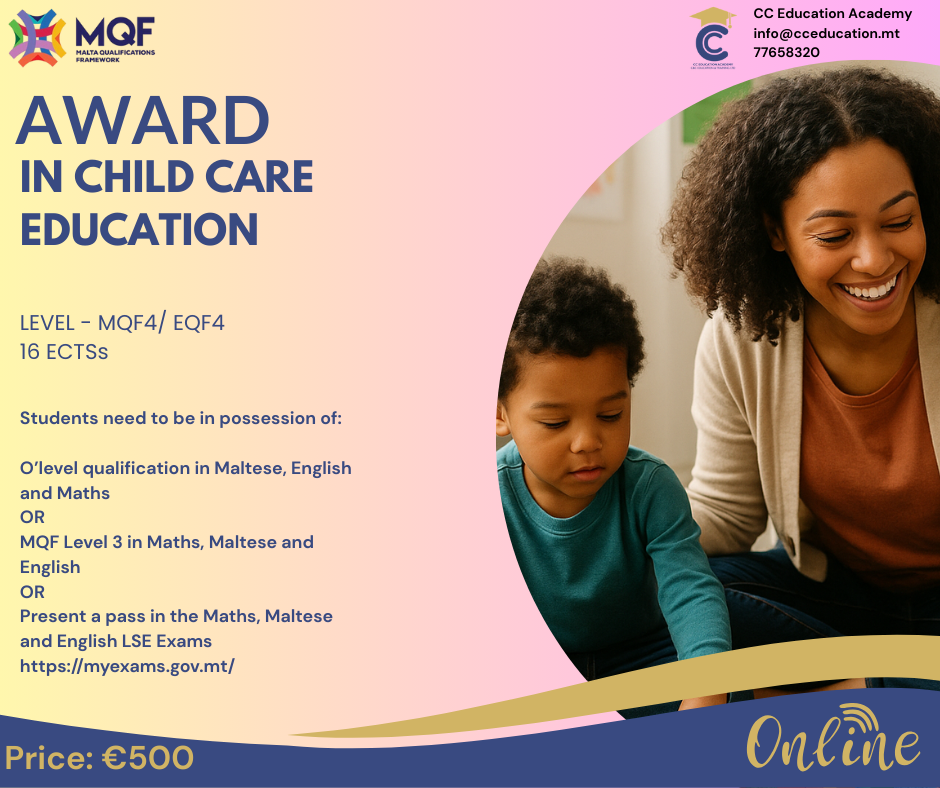
Award in Child Care Education - MQF4/ EQF4 - 16ECTS
